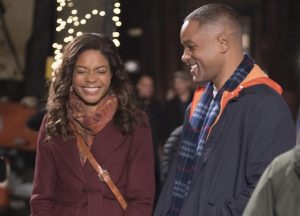
The trailer for “Collateral Beauty” made it out to be a mawkish rendition on “A Christmas Carol.” Replacing the miserly Ebenezer Scrooge would be a broken soul reeling from the death of his daughter. Replacing the three ghosts of Christmas would be Death, Time, and Love, responding to therapeutic letters of outrage. Instead of witnessing a curmudgeon find his heart, we’d watch an emotionally destroyed man gain his passion for life back. I personally wasn’t looking forward to what seemed to be schmaltzy drama reliant on emotional manipulation, but I went in with an open mind. After all, storytelling at its core is emotional manipulation. As long as the storyteller conveys it well, even the most predictable and arguably forced of melodrama can win over even the coldest of hearts.
Having seen what “Collateral Beauty” actually is, I wish I would’ve seen the schmaltzy drama instead. Oh, don’t get me wrong, the film is still a schmaltzy drama, but it doesn’t feel sincere in the slightest. At least with the perceived rendition on “A Christmas Carol,” the hokeyness of it all would’ve been heartwarming. Even if that wouldn’t have worked on me, I could’ve at least appreciated its sincerity. Such was not the case with what turned out to be a mawkish rendition on “Gaslight” instead (with heavy hints of “A Christmas Carol” thrown in for bad measure).

Death (Helen Mirren), Time (Jacob Latimore), and Love (Keira Knightley) are not fantastical manifestations of the Cosmos as believed to be in the trailer, but actors hired to convince a man he’s insane. That man is Howard (Will Smith), a once-successful CEO whose life has crumbled around him after the death of his daughter. His detachment from reality has sent his company spiraling, with his friends and colleagues facing termination as a result. In order to save the company, they hire three actors to portray what Howard hates the most as to make him fully lose his sanity. By doing so, his shares in the company will be forfeited, allowing for his partner(s) to vote on a merger that will save the company.
I neglected to mention that the friends had an ulterior motive: to ultimately save Howard from himself. After discovering that he’s writing to the cosmos, they believe that humoring his warped sense of reality will snap him out of his depression. The hope is that, by embracing what he believes to be the three elements of life, he’ll finally open up about his feelings and learn to cope with them. I neglected to mention this because, despite every intention to make me believe otherwise, I didn’t buy into this motive whatsoever.

If Whit (Edward Norton), Claire (Kate Winslet), & Simon (Michael Peña) were truly Howard’s friends, they wouldn’t even flirt with the idea of manipulating his psyche. They’d empathize with his tragic situation, consoling him via discussions and giving him his much-needed space. Yes, they’d argue with their conscience that it’s been two years and his attitude is detrimental to them and the company. However, they’d approach the touchy subject with care. They wouldn’t throw their hands up because he denies their propositions of merging, but sit him down and have a professional discourse. If and when that would fail, they’d set up a meeting with the board of directors to discuss the problem, which would be enough for them (and the possible shareholders) to determine that Howard is not of sound mind to run the company. Hiring actors to trick him and the board that he’s insane is preposterous and pointless!
Even so, I’d be willing to go along with the preposterous and pointlessness of the plot in return for effective drama. Because of my inability to accept that Howard’s so-called friends are indeed actually looking out for him, the drama is crippled. I do not sympathize when they struggle in going through with the act, as they’ve lost their right for compassion in doing so. Frivolously introducing personal plights for them, such Whit losing the respect of his daughter following a divorce, Claire struggling to become a mother following failed sperm donations, and Simon slowly dying of a disease, does not endear me towards them. The plights are too forced and undercooked for them to resonate with me. I felt nothing despite my desire to feel sorrow for them.

The only person I felt sorrow for was Howard and the reasoning is twofold. The first is obvious: the loss of his daughter is traumatizing. This isn’t enough, as simply mentioning a dead daughter can be seen as emotionally exploitive if not followed up on. Thankfully, Will Smith’s performance is strong enough to make what on paper seems emotionally exploitive anything but. His pained eyes as he drifts through life and the sense that it hurts him physically just to get through the most basic of tasks did more for his dilemma than Allan Loeb’s screenplay or David Frankel’s direction could. The only reason this film isn’t a complete failure is because of him! Even during the most sentimental of moments, I felt a tinge of power thanks to his cogent performance!
That is why my sorrow is twofold. The other reason I felt for Howard was because he was stuck in such a heartless melodrama. Hidden beneath the absurd premise is a harrowing account of a man who’s lost everything. One that respects Howard, seeing his melancholia as a defect of life, not a plot device. Instead of being used as emotional manipulation, Howard’s depression could’ve been used for catharsis. By watching him grieve and shun the world, only to slowly regain his faith through therapy and companionship with Madeleine (Naomie Harris), I’d find solace in death. It would complement both his and the viewer’s journey.

Instead, Howard is stuck in a distressing crowd-pleaser, an oxymoron of the highest order. One that is reliant on cheap dramatic devices and not one, but two lousy and predictable twists that damage the message as opposed to elevating it. One could work had it not been so obvious (and if it were in the harrowing account). The other had no chance given how blatant Frankel’s intention was on making this like “Gaslight” (he even has a character namedrop it to drive home the point). The twist robbed that angle of if its impact and stunted the growth of the “friends.” Both twists are so blatant that not only did I pick up on them immediately but so did the couple sitting next to me. From the sounds of it, they wound up enjoying the film regardless, but I unfortunately didn’t. They were forgiving of the predictability because they wanted it to reach that conclusion, whereas I dreaded it.
There has been a furor of sorts in regard to the negative reviews of “Collateral Beauty.” They are believed to be the reasoning behinds its poor box office performance on opening weekend, with those damning the critics stating they don’t have a heart. They parrot one another to see who can cough up the fiercest written lashings instead of watching the film with their hearts. I can’t speak for the film critics, only for myself. My negative review is not because of parroting or a lack of heart, but because I hated the film!

I hated “Collateral Beauty” because I wanted to love it! I wanted to connect with Howard and grieve with him, but the ludicrous scenario got in the way. I wanted to be emotionally invested in the drama, but the forced nature of it all made me feel hollow instead. There aren’t enough hands to count the amount of tearjerker moments on display, none of which work due to strained direction and sensory overload. I wanted to believe that the friends had the best of intentions, but questioned their every move. Does Whit really want to make amends with his daughter or is he solely trying because the gorgeous actress playing Love for him bribed him to do so? I truly want to believe his intentions are moral, but the framing says otherwise.
It’s a funny thing about the friends. Frankel’s direction is reminiscent of their character traits. The drama is fake in order to derive a desired emotion for personal gain ala Whit’s scheme to make Howard think he’s insane. The twists are poorly hidden out of fear it’ll ruin the moment ala Simon’s concealment of his disease from his family. The tearjerker moments are replete with advantageous dialogue and circumstances to satisfy the needs of the audience ala Claire’s insistence on telling people what they want to hear in order to make them feel good. The worst example of the latter is found in a therapy session, where the anguish of a mother losing her child is mortifyingly converted into dispassionate exploitation. On its own, it’s a sad tale; in this film, it’s disgusting emotional manipulation!

Despite my hatred for the film overall, I’m willing to give “Collateral Beauty” a ‘D’ rating. Will Smith can be thanked for that.
Final Rating: D
